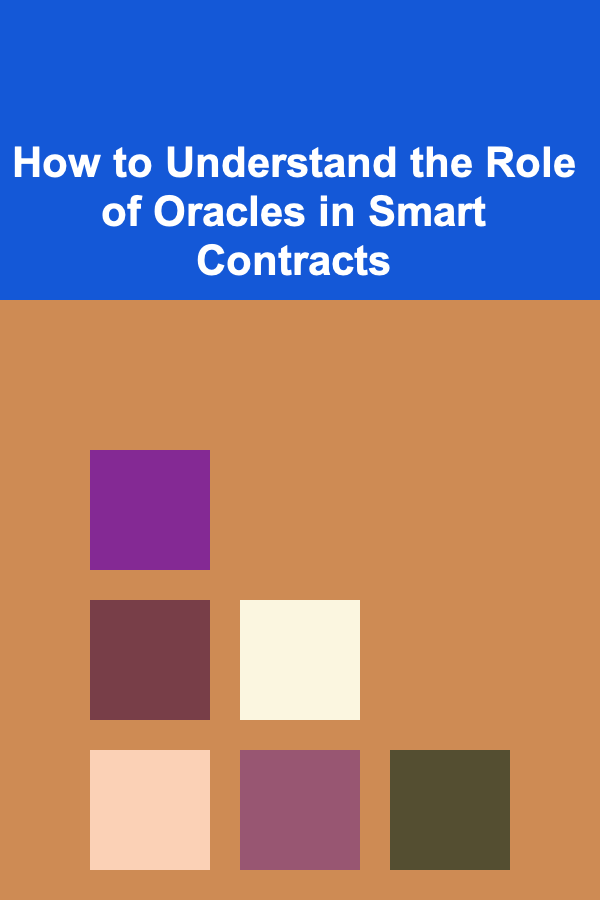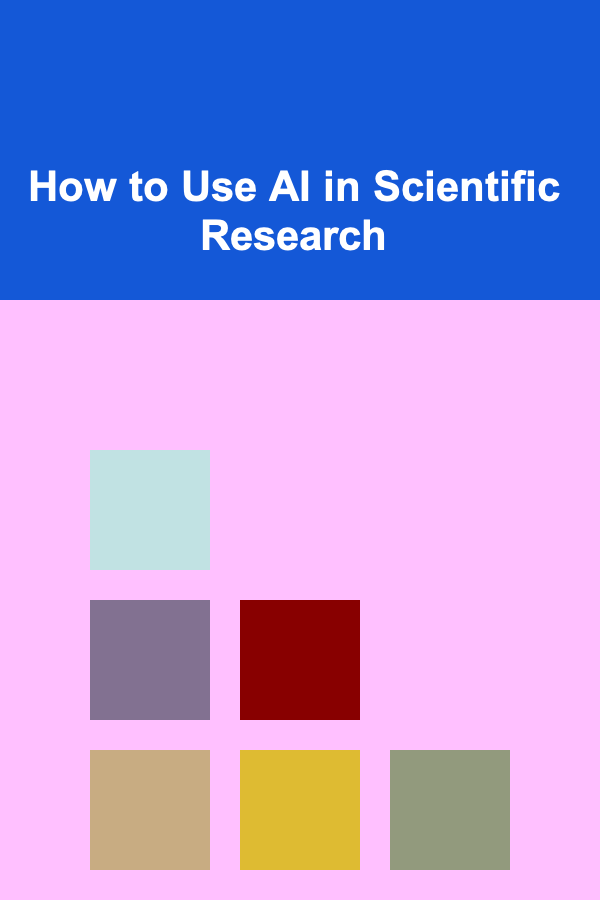
How to Understand the Role of Oracles in Smart Contracts
ebook include PDF & Audio bundle (Micro Guide)
$12.99$10.99
Limited Time Offer! Order within the next:

In the rapidly evolving world of blockchain technology, smart contracts are hailed as one of the most revolutionary innovations. They enable self-executing contracts, where the terms of the agreement are directly written into code. However, while the promise of blockchain is undeniable, its most significant limitation is its inability to interact with real-world data. This is where oracles come into play. In this article, we will explore the role of oracles in smart contracts, why they are essential, and the challenges they bring, along with potential solutions.
What Are Smart Contracts?
Before diving into the role of oracles, it's important to have a clear understanding of smart contracts themselves.
A smart contract is a computer program or protocol that automatically executes, controls, or documents the terms of a contract when specific conditions are met. These contracts operate on a blockchain, which provides a decentralized and immutable ledger. Once a smart contract is deployed on a blockchain, it cannot be altered or tampered with, ensuring security and transparency.
The most popular platform for developing smart contracts is Ethereum. However, other blockchains such as Binance Smart Chain, Solana, and Polkadot also support smart contract functionality. Smart contracts can facilitate a wide range of use cases, such as decentralized finance (DeFi), supply chain management, insurance, and more.
Key Characteristics of Smart Contracts:
- Autonomy: Once deployed, smart contracts operate automatically, without human intervention.
- Security: Smart contracts leverage the security of blockchain technology, making them resistant to tampering.
- Transparency: All parties involved can view the terms and execution of a smart contract on the blockchain.
- Cost-Effectiveness: By eliminating intermediaries, smart contracts can reduce transaction costs.
While smart contracts are revolutionary, they face one significant limitation: they cannot access data from outside the blockchain, such as real-time prices, weather reports, or other off-chain data. This is where oracles come into play.
What Are Oracles?
Oracles are third-party services that provide real-world data to blockchains and smart contracts. Oracles act as bridges between the blockchain world and the outside world, enabling smart contracts to interact with external information. They provide essential data that is required to trigger smart contract conditions.
For example, in a smart contract for an insurance policy, the contract may need to know whether a specific event, like a flight delay or weather condition, has occurred. Oracles can retrieve this information from trusted sources, such as weather APIs or flight tracking databases, and deliver it to the blockchain, allowing the smart contract to execute automatically based on that data.
Oracles are a critical component in the functionality of many blockchain applications, especially those in decentralized finance (DeFi), supply chains, and insurance.
Types of Oracles:
- Software Oracles: These oracles retrieve data from online sources, such as websites, APIs, and databases. They provide information like exchange rates, sports scores, or financial data.
- Hardware Oracles: These oracles gather data from physical devices, such as sensors, IoT devices, and GPS systems. They can track physical events like temperature, humidity, location, or motion, and feed this data into smart contracts.
- Inbound Oracles: These oracles provide data from external sources to the blockchain. For example, they may supply real-time price information for a smart contract that involves asset trading.
- Outbound Oracles: These oracles send data from the blockchain to external systems. For example, they can trigger actions such as updating a database or sending a notification to a user.
- Consensus Oracles: These oracles aggregate data from multiple sources to ensure accuracy and avoid manipulation. Consensus oracles reduce the risk of a single point of failure by using multiple data providers to ensure the data being sent to the blockchain is accurate and reliable.
Why Are Oracles Important for Smart Contracts?
Smart contracts are inherently limited by their inability to access external data. Blockchains are designed to be secure, immutable, and decentralized, but these qualities also prevent them from directly interacting with the outside world. Oracles are the solution to this problem, enabling smart contracts to access real-world data and operate as intended.
Here are some key reasons why oracles are critical to smart contracts:
3.1. Bridging the Gap Between On-Chain and Off-Chain Worlds
Blockchains operate in an isolated environment. They are self-contained networks that cannot communicate directly with the outside world. Oracles solve this problem by acting as intermediaries that bring off-chain data into the blockchain. This capability allows smart contracts to trigger actions based on real-world conditions, such as weather, stock prices, or even sports scores.
3.2. Enabling Complex Smart Contract Use Cases
The vast potential of smart contracts extends beyond simple transactions. Oracles make it possible to create complex, real-world applications that require external data inputs. For example:
- DeFi Protocols: Many decentralized finance applications rely on real-time price data from external exchanges to execute trades or manage collateral. Oracles ensure that these smart contracts receive accurate price feeds, which is essential for their proper functioning.
- Insurance: In decentralized insurance contracts, oracles can provide data regarding weather conditions, flight statuses, or medical records, allowing the smart contract to execute payouts based on these events.
- Supply Chain Management: Oracles can track the status of goods in a supply chain, such as delivery times, temperature conditions, or inventory levels. This data can be used to automate payments and trigger other actions in the supply chain process.
3.3. Enhancing Decentralization and Trustlessness
One of the most attractive features of blockchain technology is its decentralized nature. Smart contracts can execute automatically without intermediaries, reducing the need for trust in a central authority. Oracles help maintain this trustlessness by providing a decentralized means of obtaining external data.
Some oracle systems, like Chainlink, use a network of independent nodes to retrieve data from multiple sources. This decentralized approach ensures that the data provided to the blockchain is reliable and tamper-resistant.
How Do Oracles Work in Smart Contracts?
The process by which oracles feed data into smart contracts typically follows these steps:
- Smart Contract Request: The smart contract makes a request for external data. For instance, a smart contract for a weather-based insurance policy might request the current temperature for a specific location.
- Oracle Query: The smart contract sends this request to the oracle, which is responsible for retrieving the necessary data. The oracle can pull data from various sources, such as APIs, IoT devices, or public databases.
- Oracle Response: The oracle returns the requested data to the blockchain. The data is then verified by the blockchain network to ensure it is accurate and trustworthy.
- Smart Contract Execution: Once the oracle data is received, the smart contract executes its logic based on the information provided. For example, the insurance contract may release a payout if the temperature drops below a certain threshold.
The Process in Detail:
- Initial Data Retrieval: The oracle queries the appropriate external data source, such as an API endpoint for price information.
- Verification : Some oracle systems, such as Chainlink, aggregate data from multiple independent sources to ensure accuracy and prevent manipulation. This process involves reaching a consensus among data providers to determine the true value.
- Data Delivery: Once the data is verified, the oracle sends the data to the blockchain, where it is stored and can trigger the execution of the smart contract.
- Smart Contract Execution: The smart contract runs its pre-coded logic based on the data received. This might involve transferring funds, updating records, or triggering other actions.
Challenges with Oracles
While oracles are essential for enabling smart contracts to interact with the real world, they come with their own set of challenges. These challenges primarily revolve around security, trust, and reliability.
5.1. Data Accuracy and Manipulation
One of the most significant risks with oracles is the potential for data manipulation. If an oracle pulls data from a single unreliable or compromised source, it can result in inaccurate or malicious data being fed into the blockchain. This could cause smart contracts to execute incorrectly, leading to financial losses or breaches of trust.
To mitigate this risk, many oracle systems, such as Chainlink, use multiple data sources and employ consensus mechanisms. This approach ensures that data is verified by several independent providers before being sent to the blockchain.
5.2. Centralization Risks
While oracles can be decentralized, many rely on centralized services, which introduces the risk of a single point of failure. If a central oracle service is compromised or goes offline, the smart contract relying on that oracle could fail to execute properly.
To address this, decentralized oracle networks have been developed to reduce the reliance on single points of failure. By using a network of independent oracles, these decentralized systems ensure that data is more reliable and secure.
5.3. Latency and Timeliness of Data
Oracles also face challenges related to data latency and the timeliness of data delivery. For instance, in financial markets, price data needs to be delivered in real-time for smart contracts to function correctly. Delays in data retrieval could lead to smart contracts executing based on outdated information, which can cause discrepancies and errors in contract execution.
To mitigate this, oracles can be designed to prioritize fast data retrieval and delivery. However, depending on the complexity of the data, there may still be some inherent delays.
Conclusion
Oracles are indispensable in the world of smart contracts. They serve as the crucial link between the blockchain and the real world, enabling smart contracts to interact with external data and execute complex, real-world applications. However, while oracles provide immense functionality, they also present several challenges, particularly around data accuracy, security, and latency.
As blockchain technology continues to evolve, the role of oracles will only become more critical. Decentralized oracle networks, like Chainlink, are helping to address some of these challenges by providing secure, accurate, and timely data feeds to smart contracts.
Ultimately, understanding oracles and their role in smart contracts is essential for anyone looking to work with blockchain technology. Whether you're developing decentralized applications (dApps), working in DeFi, or exploring blockchain use cases in insurance, supply chain management, or gaming, oracles are an integral part of the process, enabling smart contracts to unlock their full potential.

How to Create a Cozy Family Reading Corner at Home
Read More
How to Create a Stylish Home Bar Without Overspending
Read More
How to Make Money Online as a Fashion Designer: 10 Actionable Ideas
Read More
The Comprehensive Guide to Video Post-Production: A Job-Specific Handbook for Video Editors
Read More
How to Use AI in Scientific Research
Read More
How to Roast Meats and Vegetables
Read MoreOther Products

How to Create a Cozy Family Reading Corner at Home
Read More
How to Create a Stylish Home Bar Without Overspending
Read More
How to Make Money Online as a Fashion Designer: 10 Actionable Ideas
Read More
The Comprehensive Guide to Video Post-Production: A Job-Specific Handbook for Video Editors
Read More
How to Use AI in Scientific Research
Read More